Pamelajonnesj
On this page, you find all documents, package deals, and flashcards offered by seller pamelajonnesj.
- 810
- 0
- 0
Community
- Followers
- Following
809 items
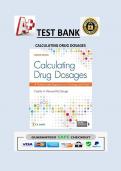
CALCULATING DRUG DOSAGES
Chapter 1: Safety in Medication Administration Castillo: Calculating Drug Dosages: A Patient-Safe Approach to Nursing and Math 2nd Edition MULTIPLE CHOICE 1. The following medication order is in the patient’s medication administration record (MAR): methylPREDnisolone 40 mg PO daily at 0900. After reading the order, the nurse correctly determines: A “PO” is an inappropriate abbreviation. B the medication order is written correctly. C 40 mg should be written as 40mg. D tall man lett...
- Exam (elaborations)
- • 204 pages •
Chapter 1: Safety in Medication Administration Castillo: Calculating Drug Dosages: A Patient-Safe Approach to Nursing and Math 2nd Edition MULTIPLE CHOICE 1. The following medication order is in the patient’s medication administration record (MAR): methylPREDnisolone 40 mg PO daily at 0900. After reading the order, the nurse correctly determines: A “PO” is an inappropriate abbreviation. B the medication order is written correctly. C 40 mg should be written as 40mg. D tall man lett...
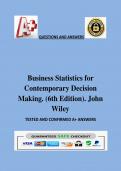
Business Statistics for Contemporary Decision Making. (6th Edition). John Wiley
Business Statistics for Contemporary Decision Making. (6th Edition). John Wiley
- Exam (elaborations)
- • 42 pages •
Business Statistics for Contemporary Decision Making. (6th Edition). John Wiley
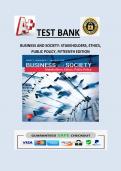
Create With McGraw-Hill Create, www.mcgrawhillcreate.com, the instructor can easily rearrange chapters, combine material from other content sources, and quickly upload selfdeveloped content such as a course syllabus or teaching notes. Content may be drawn
Create With McGraw-Hill Create, , the instructor can easily rearrange chapters, combine material from other content sources, and quickly upload selfdeveloped content such as a course syllabus or teaching notes. Content may be drawn from any of the thousands of leading McGraw-Hill textbooks and arranged to fit a particular class or teaching approach. Create even allows an instructor to personalize the book’s appearance by selecting the cover and adding the instructor’s name, school, and co...
- Exam (elaborations)
- • 594 pages •
Create With McGraw-Hill Create, , the instructor can easily rearrange chapters, combine material from other content sources, and quickly upload selfdeveloped content such as a course syllabus or teaching notes. Content may be drawn from any of the thousands of leading McGraw-Hill textbooks and arranged to fit a particular class or teaching approach. Create even allows an instructor to personalize the book’s appearance by selecting the cover and adding the instructor’s name, school, and co...
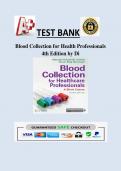
Blood Collection for Health Professionals 4th Edition by Di
Chapter 2. Venipuncture Equipment Multiple Choice 1. To prevent blood from clotting, the specimen must be A. Collected in a tube containing an anticoagulant B. Inverted an hour after collection C. Centrifuged right after collection D. Refrigerated immediately ANS: A TOP: Clinical laboratory specimens DIF: Level 1 OBJ: 2.3 2. The main anticoagulant for coagulation studies is A. Ethylenediaminetetraacetic acid (EDTA) B. Sodium citrate C. Heparin D. Oxalate ANS: B TOP: Clinical lab...
- Exam (elaborations)
- • 19 pages •
Chapter 2. Venipuncture Equipment Multiple Choice 1. To prevent blood from clotting, the specimen must be A. Collected in a tube containing an anticoagulant B. Inverted an hour after collection C. Centrifuged right after collection D. Refrigerated immediately ANS: A TOP: Clinical laboratory specimens DIF: Level 1 OBJ: 2.3 2. The main anticoagulant for coagulation studies is A. Ethylenediaminetetraacetic acid (EDTA) B. Sodium citrate C. Heparin D. Oxalate ANS: B TOP: Clinical lab...
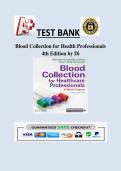
Biological Psychology 13th Edition by James W. Kalat
1. Dendrites contain the nuclei, ribosomes, mitochondria, and other structures found in most cells. a. True *b. False 2. Neurons receive information and transmit it to other cells. *a. True b. False 3. Santiago Ramón y Cajal used special staining techniques to reveal that the brain is composed of individual cells. *a. True b. False 4. An efferent axon carries information away from a structure. *a. True b. False 5. The greater the surface area of a dendrite, the more information it ...
- Exam (elaborations)
- • 19 pages •
1. Dendrites contain the nuclei, ribosomes, mitochondria, and other structures found in most cells. a. True *b. False 2. Neurons receive information and transmit it to other cells. *a. True b. False 3. Santiago Ramón y Cajal used special staining techniques to reveal that the brain is composed of individual cells. *a. True b. False 4. An efferent axon carries information away from a structure. *a. True b. False 5. The greater the surface area of a dendrite, the more information it ...
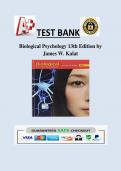
Biological Psychology 13th Edition by James W. Kalat
Dendrites contain the nuclei, ribosomes, mitochondria, and other structures found in most cells. a. True *b. False 2. Neurons receive information and transmit it to other cells. *a. True b. False 3. Santiago Ramón y Cajal used special staining techniques to reveal that the brain is composed of individual cells. *a. True b. False 4. An efferent axon carries information away from a structure. *a. True b. False 5. The greater the surface area of a dendrite, the more information it can...
- Exam (elaborations)
- • 25 pages •
Dendrites contain the nuclei, ribosomes, mitochondria, and other structures found in most cells. a. True *b. False 2. Neurons receive information and transmit it to other cells. *a. True b. False 3. Santiago Ramón y Cajal used special staining techniques to reveal that the brain is composed of individual cells. *a. True b. False 4. An efferent axon carries information away from a structure. *a. True b. False 5. The greater the surface area of a dendrite, the more information it can...
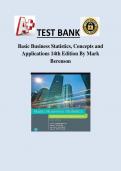
Basic Business Statistics, Concepts and Applications 14th Edition By Mark Berenson
1. The process of using data collected from a small group to reach conclusions about a large group is called a) statistical inference. b) DCOVA framework. c) operational definition. d) descriptive statistics. ANSWER: a TYPE: MC DIFFICULTY: Easy KEYWORDS: inferential statistics 2. Those methods involving the collection, presentation, and characterization of a set of data in order to properly describe the various features of that set of data are called a) statistical inference. b) DCO...
- Exam (elaborations)
- • 119 pages •
1. The process of using data collected from a small group to reach conclusions about a large group is called a) statistical inference. b) DCOVA framework. c) operational definition. d) descriptive statistics. ANSWER: a TYPE: MC DIFFICULTY: Easy KEYWORDS: inferential statistics 2. Those methods involving the collection, presentation, and characterization of a set of data in order to properly describe the various features of that set of data are called a) statistical inference. b) DCO...
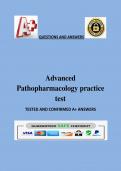
Advanced Pathopharmacology practice test
Correct 1/1 Points 1. During the body's inflammatory process, what causes edema? Vasodilation of blood vessels Emigration of neutrophils Endothelial cell expansion Increased capillary permeability 2. A 56-year-old diabetic patient has not taken his insulin in 4 days due to him” feeling well without it”. He is admitted to the ED with an elevated blood sugar. What electrolyte should be assessed FIRST? Calcium Sodium Potassium Feedback: ANS: C - Insulin facilitates the intracellul...
- Exam (elaborations)
- • 19 pages •
Correct 1/1 Points 1. During the body's inflammatory process, what causes edema? Vasodilation of blood vessels Emigration of neutrophils Endothelial cell expansion Increased capillary permeability 2. A 56-year-old diabetic patient has not taken his insulin in 4 days due to him” feeling well without it”. He is admitted to the ED with an elevated blood sugar. What electrolyte should be assessed FIRST? Calcium Sodium Potassium Feedback: ANS: C - Insulin facilitates the intracellul...
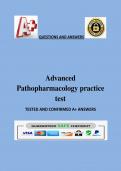
Advanced Pathopharmacology practice test
Correct 1/1 Points 1. During the body's inflammatory process, what causes edema? Vasodilation of blood vessels Emigration of neutrophils Endothelial cell expansion Increased capillary permeability 2. A 56-year-old diabetic patient has not taken his insulin in 4 days due to him” feeling well without it”. He is admitted to the ED with an elevated blood sugar. What electrolyte should be assessed FIRST? Calcium Sodium Potassium Feedback: ANS: C - Insulin facilitates the intracellul...
- Exam (elaborations)
- • 19 pages •
Correct 1/1 Points 1. During the body's inflammatory process, what causes edema? Vasodilation of blood vessels Emigration of neutrophils Endothelial cell expansion Increased capillary permeability 2. A 56-year-old diabetic patient has not taken his insulin in 4 days due to him” feeling well without it”. He is admitted to the ED with an elevated blood sugar. What electrolyte should be assessed FIRST? Calcium Sodium Potassium Feedback: ANS: C - Insulin facilitates the intracellul...

Advanced Financial Accounting 13th Edition
TEST BANK FOR Advanced Financial Accounting 13th Edition By Theodore Christensen Chapter 1 Intercorporate Acquisitions and Investments in Other Entities 1) Assuming no impairment in value prior to transfer, assetstransferred by a parent company to another entity it has created should be recorded by the newly created entity at the assets': A) cost to the parent company. B) book value on the parent company's books at the date of transfer. C) fair value at the date oftransfer. D) fair val...
- Exam (elaborations)
- • 72 pages •
TEST BANK FOR Advanced Financial Accounting 13th Edition By Theodore Christensen Chapter 1 Intercorporate Acquisitions and Investments in Other Entities 1) Assuming no impairment in value prior to transfer, assetstransferred by a parent company to another entity it has created should be recorded by the newly created entity at the assets': A) cost to the parent company. B) book value on the parent company's books at the date of transfer. C) fair value at the date oftransfer. D) fair val...
